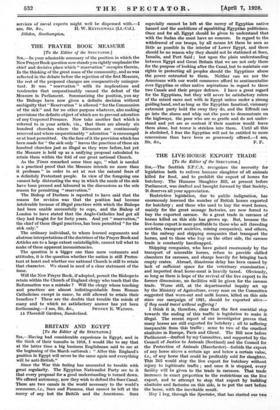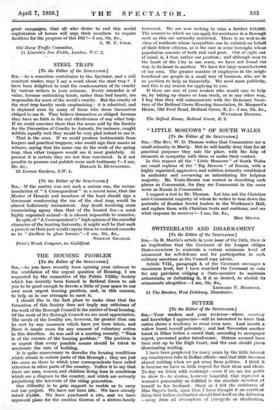-• THE LIVE-HORSE EXPORT. TRADE
[To the Editor of the SPECTATOR.]
Sur,—The Scottish S.P.C-.A. recognizes the necessity for legislation both to enforce humane slaughter bf all animals killed for food, and to prohibit the export of horses for butchery. The Humane Slaughter Bill, at present before Parliament, was drafted and brought forward by that' Society. It deserves, all your appreciation.
Reitrictive legislation, due' to public indignation, has enormously lessened the number of British horses exported for butchery ; and those who used to buy the worst horses, mainly for the great sausage factories, are now forced to buy the exported carcase. *So a great trade in - carcases of horses killed on this side has grown up. But, because the live-horse export is more profitable to those who sell (breeding societies, transport societies, mining companies), and others, to the railway and shipping companies that transport the horses, and to those who buy on the other side, the carcase trade is constantly handicapped.
- Shipping companies, who have gained enormously by the transport of miserable horses, refuse to provide chilled chambers for carcases, and charge heavily for bringing back empty crates. Abroad, disastrous delay has been caused by lack of sufficient space for the veterinary examination ; and imported dead horse-meat is heavily taxed. Obviously, so long as there is hope of the revival of the live export to its former dimensions, no facilities will be given for the carcase trade. Worse still, at the departmental inquiry set up by the Ministry of Agriculture, every man on the Committee suggested that worn-out and unfit horses, killed on this side since our campaign of 1921, should be exported alive— if could travel without suffering !
I think it is, therefore, clear that the first essential step towards the ending of this traffic is legislation to make it illegal. The recent report of our investigator proves that many horses are still exported for butchery ; all to suffering inseparable from this traffic ; some to two of the cruellest abattoirs in Europe, Paris and Ghent. The Bill now before Parliament--drafted by my Committee, and supported by the Council of Justice to Animals (Scotland) and the Council for the Protection of Animals (Manchester)—forbids the export of any horse above a certain age and below a certain value; i.e., of any horse that could be profitably sold for slaughter. This Bill would stop the live export for butchery without injury to legitimate traffic ; and once it is stopped, every facility will be given to the trade in carcases. That trade increases in exact proportion to the restrictions on the live' export, and to attempt to stop that export by building abattoirs and factories on this side, is to put the cart before the horse, with the inevitable result.
May I beg, through the Spectator, that has started our two great campaigns, that all who - detire to end this sordid exploitation of horses will urge their members to require facilities for the progress of this Bill ?—I am, Sir, &c.,
A. M. F. COLE.
Old Horse Traffic Committee, - - ' 11 Lincoln's Inn Fields, London, W.C. 2.







































 Previous page
Previous page